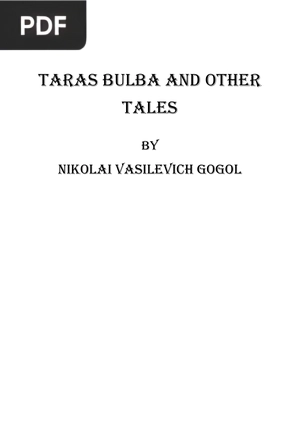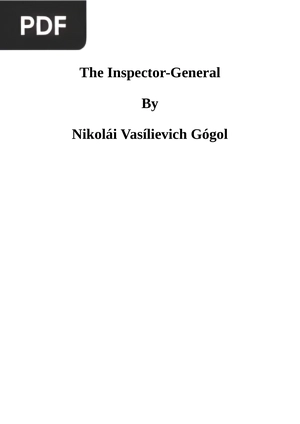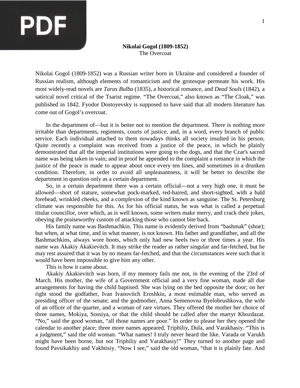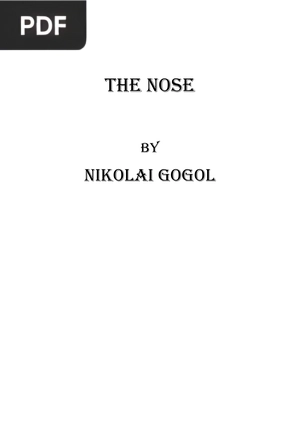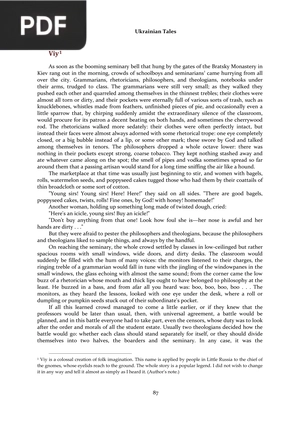Dead Souls
Author: Nikolái Gógol
*Wait a few seconds for the document to load, the time may vary depending on your internet connection. If you prefer, you can download the file by clicking on the link below.
Information
Description: <p><strong>Dead Souls</strong> is a work written and published in 1842. Gogol defined it as an epic prose poem.</p> <p>It has certain similarities with Don Quixote, as the protagonist, Chichikov, together with his coachman and a servant, sets out on a journey in his troika through the vast territories of immense Russia, stopping in towns and villages with the intention of buying souls, dead souls.</p> <p>In the Russian Empire, before the emancipation of serfs in 1861, landowners had the right to own serfs to cultivate their lands. They were, for most purposes, considered property of the landowner, and could be bought, sold or mortgaged, as an asset.</p> <p>To count serfs (and people in general), the word "soul" was used: for example, "six serfs souls". The plot of the novel is based on the "dead souls" (i.e., "dead serfs") that are registered in the land registers.</p>
Pages: 287
Megabytes: 1.3 MB
This may interest you
Taras Bulba and Other Tales
Extension: PDF | 224 pages
<p><strong>Taras Bulba</strong> is a historical and romantic novel set in the 16th century.</p> <p>It tells the story of an old zaporozhian cossack, Taras Bulba, and his two sons, Ostap and Andriy. Taras' sons, after finishing their studies at the Kiev Academy, return home. The three reunited characters embark on an epic journey to the Zaporozhian Sich in Ukraine, where they join other cossacks in the war against Poland.</p> <p>The novel is the longest short story written by Gogol. Its style is non-fiction, with characters that are neither exaggerated nor grotesque, although some scholars consider his characterization of the cossacks to be somewhat exaggerated. This story can be interpreted in the context of the romantic nationalism movement in literature, which developed around a historical ethnic culture that embraced a romantic ideal.</p>
The Inspector-General
Extension: PDF | 80 pages
<p>Also known as "The Government Inspector", it is a play originally published in 1836, satirizing human greed and widespread political corruption in imperial Russia. It is said to be based on an anecdote told to Gogol by the Russian novelist and poet Pushkin. Its main character, Khlestakov, personifies irresponsibility and the absence of values.</p> <p>News that an undercover inspector will arrive in town to investigate certain corrupt officials, including the mayor, causes all hell to break loose. At the same time, it is also learned that two weeks earlier a suspicious person has already arrived from St. Petersburg, and they presume it is the inspector.</p> <p>For critics and readers, <strong>The Inspector General</strong> is a brilliantly written work from beginning to end, with well-crafted characters and solid dialogue. One of its characteristics is the total absence of a love plot and sympathetic characters.</p>
The Overcoat
Extension: PDF | 18 pages
<p><strong>The Overcoat</strong> is a short story written between 1839 and 1841, and published in 1842.</p> <p>The story, included in the book Petersburg Tales, presents the story of Akaky Akakievich Bashmachkin, a St. Petersburg official who works as a copyist in the lower echelons of the Russian administration.</p> <p>Despite his humble status, he must spend all his savings on ordering a new overcoat to protect himself from the harsh Petersburg winter. The plot of the play is based on a story Gogol read about a poor clerk who, after a long saving, bought a rifle and lost it in some reeds while out hunting.</p> <p>The work was a critical success and had a great influence on Herman Melville, Franz Kafka and Fyodor Dostoevsky. Vladimir Nabokov considered The Overcoat to be the only "seamless" work in the history of literature, along with Kafka's Metamorphosis.</p>
The Nose
Extension: PDF | 24 pages
<p><strong>The Nose</strong> is a satirical tale written in St. Petersburg. During this time, Gogol's works focused mainly on the surreal and grotesque, with a romantic touch.</p> <p>Written between 1835 and 1836, The Nose tells the story of a St. Petersburg official whose nose abandons his face and develops a life of its own. The Nose was originally published in Sovremennik, a literary magazine owned by Alexander Pushkin.</p> <p>The use of the nose as the main source of conflict in the story may be due to Gogol's own experience of having an oddly shaped nose, which he himself often mocked in his letters.</p> <p>The use of iconic city landmarks, as well as the absurdity of the story, have made "The Nose" an important part of St. Petersburg's literary tradition.</p>
Viy
Extension: PDF | 22 pages
<p><strong>Viy</strong> is a horror story whose title refers to the name of the demonic creature that is the protagonist of the plot.</p> <p>The plot begins with the narrator claiming to tell the story as he heard it. The story is about three students who are at the Kiev theological academy. In the seminary there are four types of students: grammarians, rhetoricians, philosophers and theologians.</p> <p>Every summer, at the end of classes, the students usually set out on a long procession home, which becomes smaller as each student gets separated from the main road. Eventually, the group is reduced to three students: the theologian Khalyava, the philosopher Khoma Brut and the rhetorician Tiberiy Gorobets.</p> <p>These characters experience horror-filled events along the way.</p>


